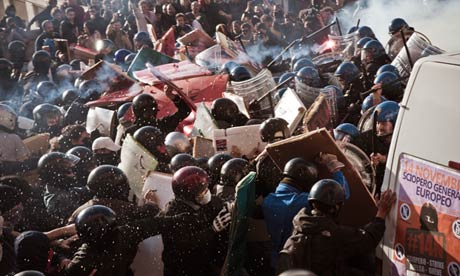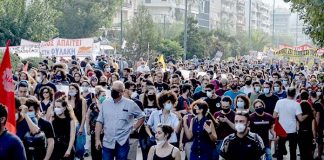Workers walked out in general strikes across Portugal, Spain, Italy and Greece as well as parts of Belgium on November 14.
In Spain this is the second general strike in a year—and more workers have been joining in.
“We were picketing from 5:30am,” Jesus Castillo, a lecturer at Seville University, told Socialist Worker. “First for the cleaners—it was the first time they’ve had a picket line. Then for the teachers and administrative workers.

“Then we marched from campus to campus, going into the few classes that were taking place and explaining to people why they should come out and strike.”
In all 90 percent of students and workers at the university did strike. Elsewhere workers in transport and manufacturing also reported very high turnouts.
By the middle of the day the cities were filling up with protesters. “There must have been tens of thousands in Seville,” said Jesus. “And this evening we’re coming back out to surround the regional parliament—it’s run by the left, who say they support the strike, but they are putting through cuts too.”
There were also to be massive evening protests in Madrid and other cities.
Thousands marched in Lisbon. There were organised blocs of dockers with flares, local government and education workers, university students and more. People waved Greek flags and placards harking back to Portugal’s revolution—and even briefly invaded a supermarket.
Italy
Thousands of workers and students converged on city and town centres across Italy as part of a four hour general strike. In Turin students occupied the central railway station and raided the police station there. They also occupied local government offices.
In Rome there was a “guerrilla war” between police and protesters as students made shields and barricades to use against police lines.
In Naples protesters lay on the tracks in the central train station and Metro workers walked out, bringing the city grinding to a halt.
“There is high support for the strike,” Leopoldo Tartaglia from the CGIL union told Socialist Worker. “The crisis of unemployment, a reduction in working hours and the wage freeze means that everyone has less.
“We are now heading to a situation where the mass of people are working poor. We will not hesitate to strike again to defeat these attacks.”
In Greece unions called a three hour stoppage from noon. Around 10,000 marched on the parliament in central Athens, and many more held meetings and demonstrations nearer their workplaces.
Local government workers protested at the town halls, many of which are occupied. And one of the liveliest contingents on the main demonstration was of the workers who have been occupying the main senate of Athens University.
These two sections of workers face massive job cuts from the cuts package narrowly voted through parliament last week.
“The union leaders want to wait and see what happens at the meeting of Eurogroup finance ministers next week, where it will be decided if Greece will get its bailout money,” said Panos Garganos, editor of Workers’ Solidarity. “But still, people came out and demonstrated across Greece.”
Belgium
There was also a general strike called in the Belgian city of Liege, where 6,000 people came out and marched. Across Belgium rail workers also struck and blocked the rails, in protests at rail cuts planned next month, and there were strikes at a number of factories and power stations.
“I was at a picket of 100 last night, and another of the same size this morning,” said Michel Abdissi of the train workers’ FGTB union. “There were major pertubations in the north, and not a single train ran in the south.
“Train workers were out against problems in Belgium—massive public sector job cuts, wages being held down compared to inflation, and the fact they want to privatise the train system like what you have in England.
“And we especially didn’t want to leave our colleagues in southern Europe to fight alone. We need a real fight for a different kind of Europe, instead of the catastrophe we see now.”
There were also protests in cities across France, as well as in other major capital cities around Europe.
By early evening thousands of protesters in Lisbon were laying seige to the Portuguese parliament. They tried to break police lines, and when pushed back started to build barricades in the side streets.
All the unions have hailed the strike as a success—even those that didn’t support it—and a national demonstration has been called in two weeks time.
“We need to follow the example of Greece, and get more action after today” said unemployed Kyria Kos on the Lisbon demonstration. “The people of the world are rising up. Together we can do it.”





